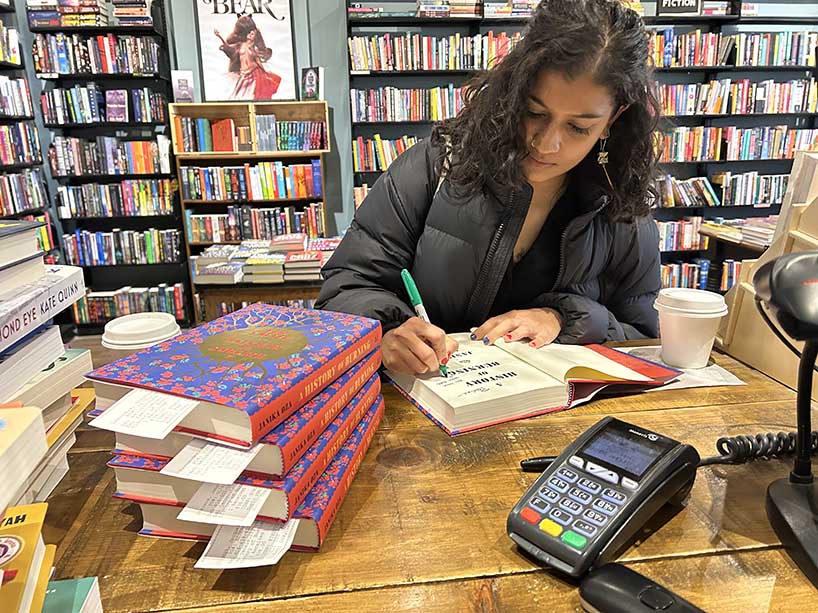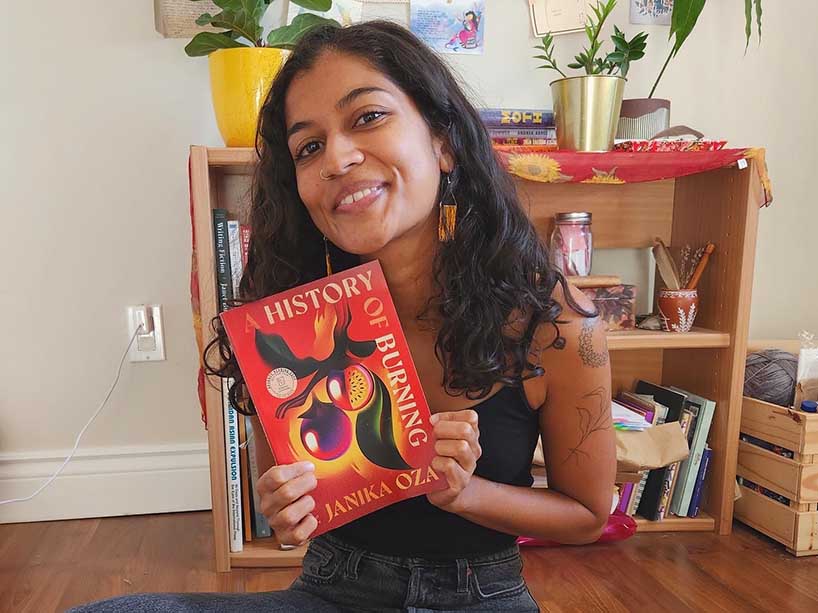TMU alumna considers the concept of home in first novel

Join TMU alumna Janika Oza on Nov. 30 for a reading and discussion of her novel, A History of Burning.
The question of where is home and what does rootedness mean has always occupied TMU alumna Janika Oza’s mind. As the only person in her family born in Canada and a graduate from the Immigration and Settlement Studies master’s program in 2019, Oza has spent a great deal of time considering the legacy of migration and colonialism in both her own family’s history and beyond.
She spent six years writing her first novel, A History of Burning (external link) , which was shortlisted for a Governor General’s Literary Award (external link) for fiction in 2023 and included in the The New York Times Book Review’s 100 Notable Books of 2023 (external link) . Oza drew from her family's experience of migration, expulsion and resettlement to craft a narrative about a community with little written history.
As Oza returns to TMU on Nov. 30 to speak about her novel, she sat down with TorontoMet Today to talk about the process of writing her first novel, how the theme relates to her master’s work as well as her personal life, and the advice she has for students who would like to write their own novel.

Writing her novel was a six-year long project that meant she was able to dive into her own family’s history as well as that of her community.
TMT: Can you talk a little bit about your book and what inspired you to write it?
My book is about four generations of an Indo-Ugandan family across about 100 years and multiple forced migrations and lands. It moves from India into Kenya and Uganda and then into exile in Canada in the U.K. The book asks what memories and stories get passed down, and what remains unspoken.
The inspiration for the novel, although it is fiction, came from my own family history. Multiple generations of my family also lived in East Africa until they were expelled by Idi Amin, the dictator, in 1972. So my great grandfather went from Gujarat, India, under British colonial rule to East Africa to work at a railway station, which was also under the British. That’s where my family was settled for three generations. This is something I always knew growing up, but outside of a couple of stories that my dad used to tell I knew very little about where we came from.
As I got older, I realized I had this kind of desperate desire to understand where we come from and what my family had been through. And so writing this book was a way of writing into that silence in my family.
Can you talk about your research process for writing the novel? How was your family involved?
I started approaching this novel as a scholar, looking through journal and newspaper articles, going to archives. And a big part of that was because this was something we didn't talk about in my family.
Quite frankly, I was very nervous to bring it up with my family. So I spent a year or two just doing research for the book, but it became pretty clear to me that there's actually very little existing research out there about this time and place and about our community. So it became clear that if I wanted to write the book and really try to do justice to our community, I would have to talk to people who'd actually been through it. So I told my family about it, and that I wanted their help. Their response was incredible, they were really excited to share these stories.
My family connected me to other members of the community, so my research process then became these big, global Zoom and Skype calls.
I approached it not just as a researcher, but as someone who is part of the community, a descendant of this history.
Tell us about the themes your novel explores.
It’s a book about colonialism, displacement, migration – both forced and chosen. Like I said, my interest came from my own family background.I was born and raised in Canada, so my relationship to migration is one generation removed. And I think that allowed me to ask questions about this history. My family were refugees, but we’re also immigrants, and we're also settlers on stolen land. So what does it mean to be all of those things, and what does home mean? Where do you find your sense of rootedness?
Did your work throughout your master’s at TMU factor into the novel? You started the work on it while at TMU.
Much of what I was thinking through and learning about when I was in the master's program at TMU informed and influenced the book. My final project in the master's program was about community and community spaces in Toronto, where different migrant communities find belonging. At TMU, I was looking at immigrant-owned restaurants and food businesses as a community hub or third space. The latter part of my novel is set in Toronto, and the family owns and works in a convenience store.
Coming out of TMU, I worked as a refugee settlement counsellor first and then as a school settlement counsellor in a few TDSB schools. A lot of the job is speaking to people, building relationships with people and hearing their stories. I found myself becoming very attuned to the ways that the stories were told, the body language shifts, the ways that the voice changes, the ways that people use humour or deflection. Or sometimes, there's no words to communicate what happened and I ended up writing a novel that's very much about how stories do and don't get told.
In coming back to TMU to discuss your book, what do you hope to share with students?
When we're thinking about migration and settlement, there are these huge questions about home, about colonization and about these ideas of solidarity and collective liberation – at least these are the things that I was thinking about.
My way of sifting through a lot of this was through fiction and through working on this book, and ultimately, I really believe in the power of narrative and the power of story, to connect with people on an emotional level. And so I hope in coming into the program and getting to chat with students that there's that chance to show that this is another way that we can come together and think through some of these bigger questions. And together we can grapple with the world that we live in and the ways that migration and displacement are going to continue.
What advice do you have for TMU students who are considering writing their own novel?
I would say the two biggest things I could offer are: practise patience, because writing is a long labour. Trust that your writing will find its audience when it's ready to. The second thing I would say is to find community. Together you kind of find your way through and can lean on each other for support throughout the writing process.
The interview is edited for conciseness and clarity.
Janika Oza returns to campus for a reading from her book followed by a Q&A on Thursday, November 30, from 12 to 1:30 p.m. The TMU bookstore will also have a table of Oza’s novel available for purchase.
Related story
